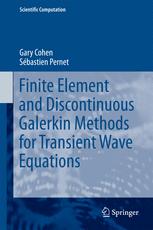

Most ebook files are in PDF format, so you can easily read them using various software such as Foxit Reader or directly on the Google Chrome browser.
Some ebook files are released by publishers in other formats such as .awz, .mobi, .epub, .fb2, etc. You may need to install specific software to read these formats on mobile/PC, such as Calibre.
Please read the tutorial at this link: https://ebookbell.com/faq
We offer FREE conversion to the popular formats you request; however, this may take some time. Therefore, right after payment, please email us, and we will try to provide the service as quickly as possible.
For some exceptional file formats or broken links (if any), please refrain from opening any disputes. Instead, email us first, and we will try to assist within a maximum of 6 hours.
EbookBell Team

4.8
24 reviewsThis monograph presents numerical methods for solving transient wave equations (i.e. in time domain). More precisely, it provides an overview of continuous and discontinuous finite element methods for these equations, including their implementation in physical models, an extensive description of 2D and 3D elements with different shapes, such as prisms or pyramids, an analysis of the accuracy of the methods and the study of the Maxwell’s system and the important problem of its spurious free approximations. After recalling the classical models, i.e. acoustics, linear elastodynamics and electromagnetism and their variational formulations, the authors present a wide variety of finite elements of different shapes useful for the numerical resolution of wave equations. Then, they focus on the construction of efficient continuous and discontinuous Galerkin methods and study their accuracy by plane wave techniques and a priori error estimates. A chapter is devoted to the Maxwell’s system and the important problem of its spurious-free approximations. Treatment of unbounded domains by Absorbing Boundary Conditions (ABC) and Perfectly Matched Layers (PML) is described and analyzed in a separate chapter. The two last chapters deal with time approximation including local time-stepping and with the study of some complex models, i.e. acoustics in flow, gravity waves and vibrating thin plates. Throughout, emphasis is put on the accuracy and computational efficiency of the methods, with attention brought to their practical aspects.This monograph also covers in details the theoretical foundations and numerical analysis of these methods. As a result, this monograph will be of interest to practitioners, researchers, engineers and graduate students involved in the numerical simulationof waves.